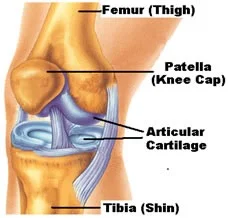As the weather gets warmer in New England, tis the season for runners to return to the streets. Last weekend, over 7,000 people ran the Holyoke St. Patrick's Day 10K Road Race! I have to admit that I did not expect to write a post about running, I mean "lift" is in the name of the blog! Running and I have had a more tumultuous relationship than Ryan and Rachel in the Notebook. We love each other, we hurt each other, we stay away for years at a time. But in the end, we get back together and this time it seems, for good.
Love it or hate it, running has some pretty obvious health benefits, like improved metabolism, heart and lung function, and the ability to eat more pizza. But this time of year also means more running injuries, especially knee pain. I hear lots of people who worry arthritis might be acting up, and plenty more who wonder if running might be causing arthritis. As a newbie runner with a history of knee injuries, I wanted to know too!
Turns out this has been a topic of interest for many years. Studies about the incidence of arthritis in former athletes date back to 70s. There are also many animal studies looking at the molecular/cell level of arthritis development and possible treatment. Interestingly, one article found that sedentary hamsters developed more joint problems than active hamsters.
These animal models have similar findings in humans. The research shows that elite level running may be harmful to joints because of the duration and intensity which goes into this type of training. For anyone below that rank, running appears to have very little, if any impact on developing arthritis. In fact, it’s more likely to have a protective effect on your bones.
The articular cartilage which covers the ends of your bones and forms joints does not have a direct nerve or blood supply. This type of cartilage requires repeated loading in order to get nutrients and stay healthy. In fact, a seemingly quick 3 weeks of bedrest causes more damage to your bones than aging 30 years!
If you already have arthritis, the research shows that running is not going to make it worse. This high quality review of research found that only baseline knee pain and Herberden's nodes (a hand deformity due to arthritis) were accurate predictors of how knee osteoarthritis (OA) worsened. They found that sex, previous knee injury, quad strength, smoking, running, and exercises were NOT associated with OA progression.
If you have joint pain, this does not mean that running will be painless and it does not mean that you have to run. Running is a high impact activity, which means both your feet are off the ground at the same time. Many people with joint pain can exercise longer if they perform low or no impact exercise such as biking, swimming, or walking until their endurance/strength/pain improve to a level which allows them to perform higher impact exercise.
As of right now, there isn’t enough research to specify exactly how much running (in miles/hours/etc) is too much. Keep in mind that this research focused on the risk of developing/progressing arthritis. You can develop other injuries from overtraining such as inflammation of tendons and stress fractures though so ditch the "no pain, no gain" mentality.
Training tips
1. Ease into it. If you are just getting started then be sure to find a training program to follow. There are tons of workouts/apps/and programs you can join to get started! Consider joining a local “Couch to 5K” program to keep you motivated and accountable!
2. Stick to the 10% rule. Only increase your mileage by 10% from the previous week. For more info on the rule, check out this article from Runner’s World.
3. Rest! There’s a difference between skipping a run because you feel lazy and skipping a run because you are in pain/injured/fatigued. In the grand scheme of things, one missed run is not the end of the world. Be sure to have at least one day of complete rest. If you are running back to back days then switch up the course, pace, and distance to prevent overuse.
Resources:
Pathology: Implications for the Physical Therapist. 3rd edition, by Goodman and Fuller.
What Are the Prognostic Factors for Radiographic Progression of Knee Osteoarthritis? A Meta-analysis. September 2015, available at http://www.ncbi.nlm.nih.gov/pmc/articles/PMC4523522/
Running a marathon induces changes in adipokine levels and in markers of cartilage degradation--novel role for resistin. October 2014, available at http://www.ncbi.nlm.nih.gov/pubmed/25333960











